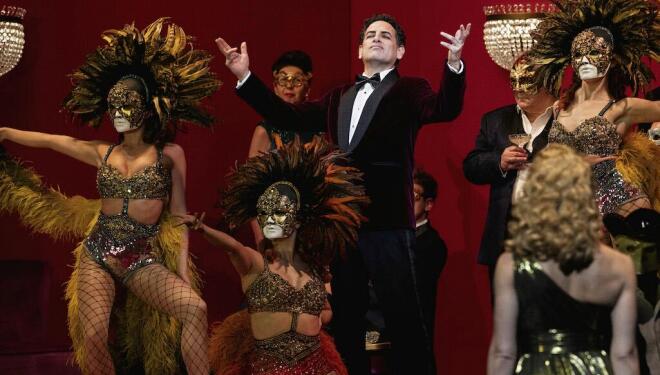
The poet Ernst Theodor Amadeus Hoffmann pops up in the history of dance as the author of stories on which The Nutcracker and Coppelia are based. But it is his own, highly embellished, romances, one of which overlaps with the idea of Coppelia, that are set to music by the French composer who hoped for success beyond musical comedy.
In the first of Hoffmann's failed affairs, recalled in older age, he falls as a young man for Olympia, who, like Coppelia, proves to be a mechanical doll. Next comes Antonia, who is doomed to die should she sing (or here, dance to) a certain song. Finally, he is tricked by Venetian courtesan Giulietta into giving away his shadow, but in a battle with his nemesis Giulietta is mortally wounded.
Hoffmann relates that all three women are versions of one Stella, who he is too drunk to recognise when she appears in her own right….
An extravagant new production of The Tales of Hoffmann at the Royal Opera House is a co-production with Opera Australia, Opéra National of Lyon and La Fenice in Venice, the sort of collaboration that helps fund productions on this scale. Directed by Damiano Michieletto, its already big cast is joined by dancers, actors and circus artists, all adding to the built-in, dream-like craziness acted out in and around boxes of light.
Red-horned demons judder around Hoffmann's nemisis, in his various forms. Ballet dancers, junior and senior, represent the fatal artistry of Antonia, and the episode in Venice is the production's cue to go all out for louche glamour. But the beauty is in the singing, from an exceptional cast which survives rather than is supported by a hectic show. Antonello Manacorda conducts the Orchestra of the Royal Opera House and the Royal Opera Chorus.
In the title role, the Peruvian-born tenor Juan Diego Flórez reliably delivers his distinctive ringing high notes, and his young and old Hoffmann are equally believable. His nemesis in four guises, including that of the doll's creator Coppélius, is more strongly sung and powerfully depicted in a quartet of creepy ways by Italian baritone Alex Esposito.
The first of Hoffmann's three flashback desires is to Russian coloratura soprano Olga Pudova's Olympia, her seemingly limitless vocal aeronautics as nimble as her droll and doll-like movements are comically awkward. Next comes soprano Ermonela Jaho as Antonia, portrayed not as a singer but, illogically, a dancer, her voice nevertheless as wondrous as ever.
In the Venice scene, there is a spectacular house debut by American mezzo-soprano Marina Costa-Jackson as glamorous Giulietta. Does that surname ring a bell? Her sister Ginger made a big impression in the title role of Carmen in her English National Opera debut last year. There is a third sister, Miriam, also a singer...
Marina's Giulietta is sensuous, a seductive package of gold lamé, long legs and sumptuous, full-bodied low notes. It's quite a turn in its own right, and renders all the writhing around her pretty much superfluous.
And superfluity is probably what drags this production down when Michieletto and his team, including set designer Paolo Fantin and costume designer Carla Teti, undoubtedly intended to lift it up. Strip away the stilt-walking, demons, stuffed parrot, even the dancing moppets, sweet and talented as they are, and underneath there are strongly sung episodes in an essentially charmless life. Maybe nothing can make the self-pitying Hoffmann attractive to a modern artist, even Floréz's warm singing, but his appeal might increase if he weren't hanging out with big blokes in braces.
The Tales of Hoffmann is sung in French, with English surtitles. Further performances are on 12, 15, 18, 21, 25, 28 Nov and 1 Dec. Click here to book
| What | The Tales of Hoffmann, Royal Opera House review |
| Where | Royal Opera House, Bow Street, Covent Garden, London, WC2E 9DD | MAP |
| Nearest tube | Covent Garden (underground) |
| When |
07 Nov 24 – 01 Dec 24, Nine performances, start times vary. Running time 3hr 35min, including two intervals |
| Price | £13-£300 |
| Website | Click here for details and booking |
